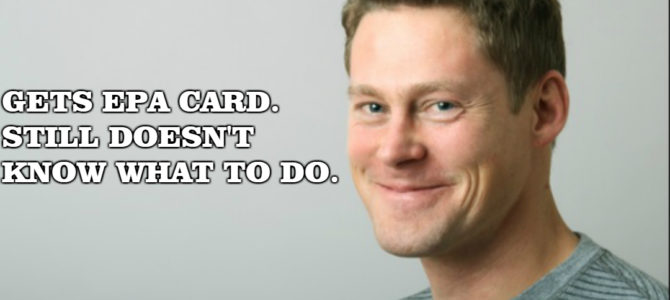Okay folks, it’s time to address a falsehood that’s been spreading through the apartment industry faster than a crop duster’s fart at Disney World. I’ve been hearing it since I started in the business 15 years ago. And the legend goes like this: “You need to take the EPA class and get HVAC certified.” Or, the favorite job interview question, “Do you have your EPA card for HVAC certification?” Ladies and gents, having an EPA certification does NOT mean you’re an HVAC certified technician! Regional managers and property owners – I hope this article reaches you because you’re the ones tying manager’s hands with this demand and turning away good people because of this stupid card that you insist they have.
Now, before I go any further let me just say that taking the EPA class and getting certified is necessary and not a total waste of time. This article isn’t about bashing the certification. It’s about educating managers and owners on what it really is. It’s so you can buy and legally handle Freon. That’s it!
I took the EPA class about 13 years ago. I passed with universal status, thank you. Anyway, from what I hear about the class today, not much has changed. It’s still the same ESCO exam preparatory manual that I studied for a month and the same 6 hour class where I took the exam. Did you catch that? I said, “the same 6 hour class”. To earn an actual HVAC certificate or degree, you have to enroll in an HVAC associate’s degree program at a community college, trade school, or technical academy. The program can take between six months to two years to complete. Not 6 hours!
Now, let me shed some light on what I remember learning. After I passed the exam and walked out of the 6 hour class, I knew that chlorofluorocarbons were bad and that you could get into some serious trouble for venting that stuff into the air. And don’t even get me started on hydrofluorocarbons. Yikes! I knew all the laws and the bills passed by congress regarding Freon. I even knew the dates when they were passed! Boy was I ready to start working on some A/C units. I was fired up! Bring it on Goodmans!
The next day after the congratulatory handshakes and accolades died down, I received my first A/C work order as an EPA certified tech. The unit wasn’t turning on. I was confused. This had nothing to do with chlorofluorocarbons, hydrofluorocarbons, or even Freon for that matter. I kind of knew how to charge a unit with Freon and was ready to blast it with R-22. I had the card to legally do it! But the unit’s not turning on! I think Nancy Kerrigan said it best when she said, “Why?! Why me?”
This wasn’t part of the class and the ESCO exam preparatory manual didn’t say anything about this. I was stumped. Finally, after 2 hours of pressing the contactor in with my screwdriver and hoping it would magically stay on, I decided to ask for help. I was embarrassed. I could see it on everyone’s face in the office too. They had a, “Geeez he just took an HVAC certification class and couldn’t fix the A/C” look on their faces. The property manager had to call another property that had an actual HVAC tech working with the company. He came over and showed me the loose yellow wire that slipped out of the thermostat terminal.
That day I got a dose of reality. The EPA card hype was a bunch of mumbo jumbo and I still knew nothing about working on air conditioners. Charging an R-22 unit at the time meant filling it to 70 psi and that was it. That’s how another EPA card holder showed me how to charge an A/C unit. I didn’t know any better. I never searched for the Freon leak or fixed the leak. And, I’d never heard of superheat and subcooling. Why? Because it wasn’t taught in the EPA class and no one ever showed me.
I hope you catch my drift with this article. Thinking that a new technician with a shiny new EPA card is now an HVAC guru is only setting that technician up for failure. That’s like telling someone who can’t swim to read a book about swimming for a month and then telling them to jump into the swimming pool’s deep end. HVAC is a life long learning experience. Every day is a school day.
So, in my opinion managers need to be sure their maintenance technicians are getting hands on training from professional HVAC technicians before they take the EPA exam. They should learn how to troubleshoot units and charge them correctly so that after they’ve passed the exam they can approach HVAC work orders with confidence. They can get the hands on training in classes that last longer than a day or your company can get off its wallet, stop being cheap and hire some true blue HVAC guys to train your techs in the field. It’s up to you!
To this day I still don’t understand why most of the apartment industry tries to cut corners on one of the biggest expenses for all properties. Paying an EPA card holder $14.00 an hour will end up COSTING you thousands while paying an actual HVAC tech $22.00 an hour or more will SAVE you thousands down the road. Trust me I know. I was that $14.00 EPA card holder and I wasted a lot of money buying jug after jug of Freon because I didn’t know how to find and fix Freon leaks at the time. I just filled the unit up and moved on. And when all the Freon leaked back out, I’d fill it up again. And again! And again! And again! Don’t even get me started on parts changing!
Today I am pretty confidant working with A/C units. The rude awakening I got the day after I passed the EPA exam let me know that I needed to take HVAC seriously or every summer was going to be a stress-fest. I started a life long HVAC journey that continues to this very day. And sometimes I still need help. Like I said, every day is a school day with HVAC and becoming a cocky, know-it-all supertech is a dangerous mindset. HVAC karma will knock you down a couple of pegs if you think you’ve seen it all and know it all. Back when I started the journey, I had to study books about HVAC and watch the old veterans who I had to call for help all the time. Today, it’s easier than ever to learn HVAC techniques by watching YouTube videos about A/C repair.
So, managers and property owners, I hope this article has enlightened you on what the EPA certification is. In a nutshell, you study an ESCO EPA Certification Preparatory Manual and memorize facts and laws about Freon venting. You learn nothing about working on actual A/C units. So just know that your technician isn’t coming back from his or her exam as an HVAC guru. You don’t even have to take the 6 hour class like I did. You can just buy the preparatory manual and study it for a few weeks and then go to an HVAC supply house like JohnStone Supply and take the exam there. It’s a very simple process.
Oh, and one more thing before I go. Stop letting techs who don’t want to go on call get out of having to go on call due to not having an EPA card. Sure they can’t handle Freon to charge units. But, you don’t need an EPA card to roll a temporary window unit into an apartment. You don’t need an EPA card to suck the water out of a float switch. Everyone needs to shoulder the on call burden as a team. Don’t hand feed them an excuse to not pull their weight.
-Related Blog Posts-
9 Things That Will Make You An Unlikable Maint. Tech – Link
YouTube University Will Make You A Better Maint. Tech – Link
10 Reasons Why You Can’t Find Good Maintenance Techs – Link
Easy Ways Maint. Techs Can Pile Thousands Of Dollars – Link
Good Tools For The Apartment Maintenance Trade – Link
Should The Property Management Company Buy Your Tools –Link
The Maintenance Man Myth – Link
Good HVAC Tools For Apartment Maintenance Technicians – Link
How To Get Into The Apartment Industry – Link
Going On Call As An Apartment Maintenance Technician – Link
How To Deal With A Goodbye Talker – Link
How To Have A Successful Student Housing Turn Season – Link
How To Handle Working With A Hider – Link
Dirty Maintenance Cheat Sheet – Link
If you’d like to support Dirty Maintenance Nation, you can do so by shopping for tools or whatever you need on Amazon through,
Disclaimer: This page contains affiliate links, which means that if you click on the link and make a purchase, I’ll receive a small commission. Lex Vance is a participant in the Amazon Services LLC Associates Program, an affiliate advertising program designed to provide a means for sites to earn advertising fees by advertising and linking to amazon.com







Lex, if you use the word “Freon” one more time… You brought up community college and all I can think of is my old instructor Mr. Gay pulling at his imaginary hair (bald head) for use of the term. Freon is a brand name. Like how not all sodas are called (Pepsi, Coca-Cola, RC) than not all refrigerants are called Freon. Sorry, it’s just one of those things that makes me and him twitch
On the subject, while you’ve made use of images depicting young men to get your point across, I’ve met my fair share of managers, and senior technicians not know anything outside of watching others to gain an understanding. Heaven forbid you ever get specific. My supervisor doesn’t even know what the mfd is on our dual capacitors. You ever have a service technician get ready to junk an evaporator because he was too inept to discover that the coil is dirty? How about the guy that can’t tell the difference between a leak from a condensate drain pan and knowing the drain is unclogged? Or the fact that the 23 year veteran needs to call me on my weekend off call just to confirm that the thermal fuses on the furnace are broken?
You’re right. I was going to write “refrigerant” but decided to use Freon because that’s what the everyday person knows it as. Thank you for reading Allen!